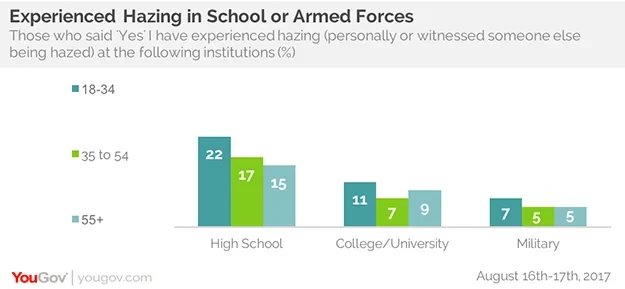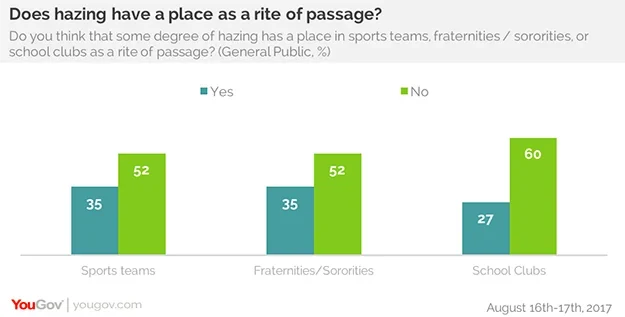Despite high profile tragedies, 35% of Americans think hazing has its place
The subject of hazing at educational institutions went mostly undiscussed in the public sphere for many years. In light of several high profile cases in the last decade, like the death of 19 year old Timothy Piazza, a Penn State freshman who suffered a fatal alcohol-induced fall down the basement steps in the Beta Theta Pi frat house, the hazing issue has been brought into full view. New data from YouGov suggests that while a large majority of Americans have not experienced hazing, the issue remains and may in fact be slightly more prevalent today than in years past.
Respondents were asked about their experiences with hazing in high school, college/university, and the military. Respondents were given the following context, “When we refer to "hazing" we mean ‘to force a new or potential member of a group (e.g., military, college fraternity/sorority, sports team, etc.) to perform strenuous, humiliating, or dangerous tasks that often include drinking or physical activity as part of an initiation.’”

A majority of the general public polled said that they did not experience hazing in high school, college or the armed forces. But the number of respondents who said they have experienced hazing was highest among younger respondents at each of the institutions we asked about. Frequency of experiencing hazing was highest in high school, at 22% of respondents.

As many as 35% of respondents said that hazing has a place in educational institutions. 18-34 year old respondents are likely to say that hazing has its place as a rite of passage on sports teams, greek life organizations and school clubs. 35% of the general public polled said hazing has a place on sports teams, but 49% of 18-34 year olds shared this opinion and only 25% of 55+ respondents did. A similar disparity was observed on the question of hazing on school clubs and greek life organizations – with 23% more 18-34 year olds supporting hazing as a rite of passage to some degree than 55+respondents in both cases.
For full results, see here.










